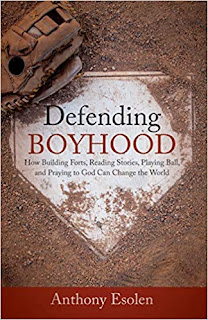A Necessary Book Reviewed: Defending BOYHOOD
First, a word of context. Dr. Anthony Esolen could write a cookbook, and I would read it with admiration - for the splendour of his words far surpasses anything our society could, or want to, produce. I imagine it would read, “Complement your sustenance with one trifle of salt, for “We have some salt of our youth in us,” sayeth Shakespeare, and so too should your meatloaf…” Something like that. Now, on to the book review.
What happens when the best writer in the English language alive today writes a book on a topic I personally have a deep-seated interest in? The result is a book so astute, masterful, and essential, I have little hope of adequately sharing its impression on me. I speak of Dr. Anthony Esolen’s Defending BOYHOOD – How Building Forts, Reading Stories, Playing Ball, and Praying to God Can Change the World (TAN Publishing).
I have written before on my experiences dealing with boyhood’s clash with the world, particularly in the public school setting. Esolen’s book dissects this milieu rather thoroughly, using his trademark wit and insight. I am not surprised by this. What Esolen did, however, that I wasn’t expecting, was challenge me personally in my own family, particularly in how I am as a father for my boys (now three of them).
Why do I play hockey with my boys? Why am I happy that they invent and build things? Why do we homeschool? Why do we frequently drive 2.5 hours to a Latin Mass? Why am I very nervous that there are no good Catholic boys around for them to be friends with? Why do we regiment chores? Why pray the rosary together? Why plant a garden? Why and how do we raise these boys to become good Catholic men?
My wife and I do what we do because we innately know what our boys need physically, emotionally, and spiritually. But to understand the inherent reasons why? Esolen touches the depths of this mystery. Through personal examples, Scripture, literature, history, and everything in between, we are shown why boys are required to become men, and why so many are not achieving this requirement.
A lengthy, but worthwhile, quote:
“What attracts woman to the person of Jesus is not exactly the same as what attracts the boy. The woman wants from Jesus forgiveness and consolation. The boy wants – even if he does not know it – severity and commandments. The woman wants Jesus of infinite patience and mercy. The boy wants Jesus eager with a baptism that will set the world on fire. The woman wants peace. The boy wants war. They are both quite right to want what they want, and I do not say that the woman will never want Jesus the fighter or that the boy will never want consolation. But the woman who brings to the boy the Jesus of peace and patience and mercy brings to him, without perceiving it, a Jesus who will not throw open to him the doors of the world, and life. The boy does not want a domestic Jesus. He wants the Lord of the universe. He does not want to hold hands at the altar with a priest and an altar-girl. He wants to swing the thurible as if it were a sword” (p. 82-83).
Defending BOYHOOD must be read by all men; and by those who think they are men but really are self-absorbed males who have never entered the arena to live and fight. It must be read by women, such as the holy mother who understands her sons need to move, act, sing, and battle; and it must especially be read by the woman who thinks a boy is stupid for not excelling at 6 hours of desk work a day. It must be read by priests who train young boys for priesthood, fatherhood, and to swing the thurible as if it were a sword; and it must be read by the priests who subject such boys to effeminate liturgies that no true boy can rightly stand.
Defending BOYHOOD is just that, a defence of boyhood, of which there can be nothing more important for the world today. If we do this, the boy becomes a man, the man becomes a noble warrior of God - a power for the world to fear: “And he shall be like a tree which is planted near the running waters, which shall bring forth its fruit in due season. And his leaf shall not fall off: and all whatsoever he shall do shall prosper” (Psalm 1:3).
“Dear
Reader, may it be so for you and yours.”
-
final
line







Comments
Post a Comment